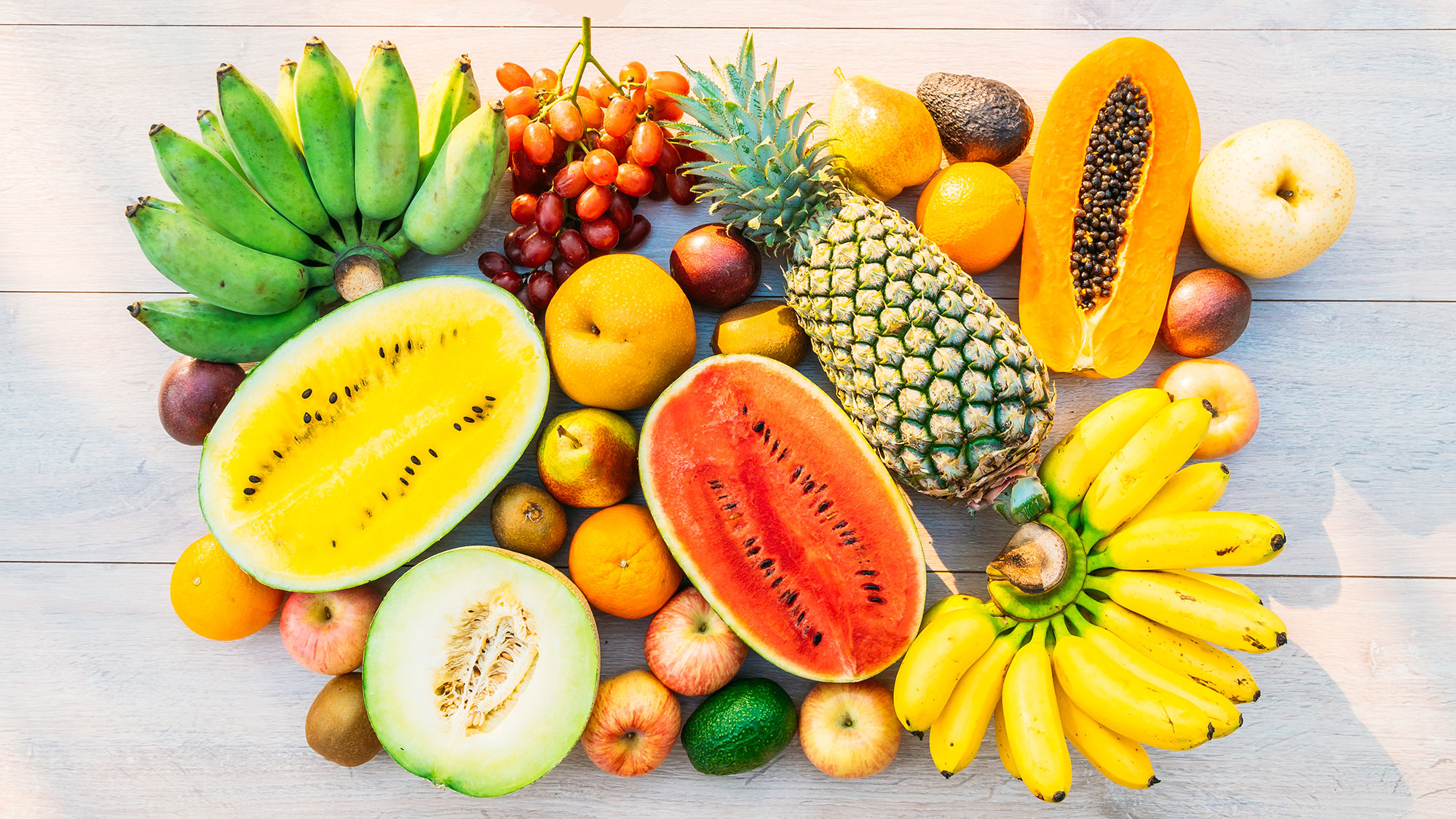
Start your week with achievable workout ideas, health tips and wellbeing advice in your inbox.
You are now subscribed
Your newsletter sign-up was successful
It's natural to find yourself asking the question 'is fruit healthy?' - especially in today's day and age.
With all sorts of information (and mis-information) flying around, figuring out how to eat healthily can sometimes feel like a bit of a minefield - and the F word is no different.
After all, with fruits tending to be naturally high in sugar - something that has been rightly demonized in recent years - you may think that fruit should be firmly relegated to the bin, right?
Actually, no - as it turns out that the truth isn't quite so straight forward.
‘The sugars we’re encouraged to cut down on are ‘free sugars’ – concentrated forms of sugar added to foods during cooking, manufacturing or before consumption, including honey and syrup,' notes Michelle McGuinness of the British Dietetic Association. In the US, free sugars are usually known as 'added sugars'.
In both adults and children, the World Health Organization (WHO) recommends reducing the intake of free sugars to less than 10% of total energy intake - a figure mirrored in the latest Dietary Guidelines for Americans (DGA). In the UK, the figure is 5%, according to the NHS.
The main reason for this is that eating too many ‘free sugars’ is linked to weight gain and, in turn, increased risk of type 2 diabetes. But, crucially, fruits do not fall into this category. As the UK's NHS website states: 'Sugars occur naturally in foods such as fruit, vegetables and milk, but we do not need to cut down on these types of sugars.'
Start your week with achievable workout ideas, health tips and wellbeing advice in your inbox.
McGuinness explains: ‘By contrast [to free sugars], whole fruit is low in calories because the intrinsic sugars in whole fruit are less concentrated as it also contains water and fiber. That fiber also means it takes time to digest, meaning a slower sugar uptake.'
So when eating fruit, you don’t get that sudden peak and dip in blood sugar levels and energy that you get when you chow down on, say, a Mars bar.
And don’t forget what else fruit is packing. ‘It contains vitamins, minerals and fiber, and many studies conclude whole fruit intake is associated with lower risk of heart disease, stroke and type 2 diabetes,’ adds McGuinness.
For these reasons, the UK's NHS has concluded: 'Sugars occur naturally in foods such as fruit, vegetables and milk, but we do not need to cut down on these types of sugars.'
Is fruit juice healthy?
Fruit juice does still contain nutrients and, as such, one 150ml glass of unsweetened 100% fruit juice counts as one of your five a day, according to NHS guidelines in the UK.
The latest DGA guidelines (released in December 2020) take a similar view, listing 100% fruit juices as a 'nutrient dense' form of fruit consumption.
However, somewhat confusingly, in 2018 Public Health England defined fruit juice as a free sugar, because much of the fiber content is removed.
The message therefore is to limit your intake of fruit juice. The DGA notes that 'at least half of the recommended amount of fruit should come from whole fruit, rather than 100% juice.' Meanwhile in the UK, NHS advice is not to exceed one serving (a 150ml glass of unsweetened fruit juice) a day.

McGuinness adds that the best time to drink a fruit juice is with meals. ‘Consuming it with a meal will delay the absorption of the sugar, as it’ll be mixed in with other food slowing digestion,’ she explains.
An additional word of warning when it comes to bottled or carton juice: 'fruit juice concentrate' is another name for added sugar in processed foods. ‘This is simply free sugar and wouldn’t offer any nutritional benefits,’ warns McGuinness.
It's not all bad news, though. ‘The concentrated source of vitamin C in a glass of orange juice can help increase the uptake of iron from plant sources – for example, most leafy greens – when consumed together,’ says McGuinness. Try adding blending OJ with curly kale for a healthy smoothie recipe (we've picked the best blenders up to the job of whizzing them up).
Is dried fruit healthy?
Dried fruit makes it onto the DGA's list of 'whole fruits'. That's because they do contain a hit of nutrients, so a small (1oz/30g) portion happily counts as one of your five a day - although McGuinness warns vitamin C content is generally reduced when fruit is dried.
She also advises against scoffing handfuls. ‘The water has been removed, which concentrates all the sugar in a much smaller package so, gram for gram, dried fruit is higher in sugar – and calories – than whole fruit.’
The advice? Watch your portion size when it comes to eating dried fruit, and eat it with meals to help protect your teeth.
Is canned fruit healthy?
Canned fruit also features on the DGGA's list of 'whole fruits'. Whilst they may feel retro, once again a portion counts as one of your five a day.
‘Most nutrients are preserved, although the high heat used in the canning process can damage water-soluble vitamins such as vitamins C and B,’ notes McGuinness. ‘But cans are convenient and don’t spoil quickly.’
As with fruit juice and dried fruit, the advice is to limit your intake. Also be sure to look for those canned in their own juices, not syrup, as the latter will up the sugar content per serving.
Is frozen fruit healthy?

‘Sometimes frozen fruit can be slightly higher in nutrients as it’s frozen shortly after picking, whereas fresh fruit often has a long transport time meaning it’s closer to spoiling when it reaches the supermarket,' says McGuinness.
What's more, frozen fruit can prove to be good value as it lasts - good news for anyone who regularly finds themselves throwing away moldy fruit.
McGuinness's top tip? ‘I add a portion to my yogurt in the morning to keep it cool for lunch.’
The health benefits of different colored fruits
We're often told to 'eat the rainbow'. This advise applies to our overall diet, however there are various health benefits to be gained from eating a variety of different colored fruits. Below, McGuinness provides an overview of what to look for:
Purple/blue fruits
‘Chemical compounds called anthocyanins contribute to the color of fruits such as blackberries, plums and blueberries. Studies have linked anthocyanin-rich foods with protection against cardiovascular disease.’
Orange/yellow fruits
‘Yellow or orange-colored fruits, such as mango, apricot and grapefruit, tend to be a good source of beta-carotene, which helps support immune function and keep skin healthy.’
Red/pink fruits
‘Lycopene is an antioxidant, linked with anti-inflammatory properties, responsible for the color in fruits such as pink grapefruit.’
Is fruit healthy? Final thoughts
The latest DGA advises that 'most people would benefit from increasing their intake of fruit, mostly as whole fruits in nutrient-dense forms.' Whole fruits include fresh, canned, frozen, and dried forms.
However, as we have seen, guidelines often apply as to how and when fruit should be consumed when it comes to things such as fruit juices.
Whilst fruit does typically contain natural sugars, these are not deemed to be bad for us - unlike 'free sugars'. Also known as 'added sugars', these are defined as those added to foods by the manufacturer, cook or consumer, as well as sugars naturally present in honey, syrups and fruit juices. Consumption of these should be kept to a minimum - less than 5-10% of overall daily calorie intake.
One way to do this is by not fixating on veggies being for savory dishes and fruits for dessert, concludes McGuinness.
‘Making fresh fruit salsas to go with meals, such as mango salsa with curry, is a great way to eat more fruit,’ she says. ‘Adding fruit to salads can sweeten them up without the need for a dressing, too.’
Plus, you'll have satisfied your sweet tooth, so will be less likely to reach for something sugary after finishing your main meal - which only adds extra (usually unhealthy) calories to your daily intake.
Launched in 2020, Fit&Well.com is all about helping you meet your health and fitness goals in ways that are fun and achievable. With news and features on fitness, weight loss, running, nutrition, yoga, wellness and more, we're committed to helping you wherever you are on your fitness journey. We break down the best fitness tech, with reviews, buying guides and the latest deals on fitness and wellness kit, from dumbbells to diffusers.
We cater for all difficulty levels here. It doesn't matter if you're a beginner in the world of fitness or you're gearing up for your tenth marathon: we're all moving towards the same goal – creating a healthier, happier you. From guides on getting started doing walks around the block, to creating the perfect work-from-home space, to eating to fuel your first triathlon. It's all here.

